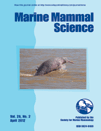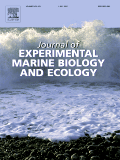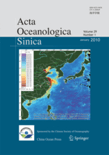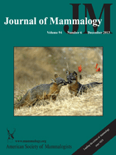
MARINE MAMMAL SCIENCE
Scope & Guideline
Unraveling the mysteries of marine mammal behavior and biology.
Introduction
Aims and Scopes
- Ecology and Behavior of Marine Mammals:
Research articles often explore the ecological roles, foraging behaviors, and social structures of marine mammals, providing insights into their natural history and adaptations. - Conservation and Management:
The journal emphasizes conservation strategies and management practices for marine mammal populations, addressing threats such as habitat loss, climate change, and human-wildlife interactions. - Physiology and Morphology:
Studies on the physiological and morphological aspects of marine mammals, including adaptations to their aquatic environments and the health implications of various stressors. - Acoustic Monitoring and Communication:
Research often includes the study of vocalizations and acoustic behaviors of marine mammals, which are crucial for understanding their social interactions and responses to environmental changes. - Genetics and Population Dynamics:
Genetic studies related to population structure, dynamics, and health are common, aiding in conservation efforts and understanding evolutionary processes within marine mammal species.
Trending and Emerging
- Impact of Climate Change:
Recent publications increasingly focus on the effects of climate change on marine mammal behavior, distribution, and population dynamics, addressing urgent conservation needs. - Technological Innovations in Research:
The use of advanced technologies such as drones, acoustic monitoring, and machine learning for data collection and analysis is trending, enabling more efficient and detailed studies of marine mammals. - Health and Disease Monitoring:
There is a growing emphasis on health assessments, including the impacts of pollutants and diseases on marine mammal populations, which is critical for conservation strategies. - Community Engagement and Citizen Science:
The rise of citizen science initiatives highlights the importance of public involvement in marine mammal research, fostering greater awareness and conservation action. - Cross-Disciplinary Approaches:
An emerging trend is the integration of various scientific disciplines, including ecology, genetics, and social sciences, to address complex marine mammal conservation challenges.
Declining or Waning
- Traditional Taxonomy Studies:
There appears to be a decrease in classical taxonomy-focused studies as researchers increasingly rely on genetic data to inform species classification and evolutionary relationships. - Human-Animal Conflict Studies:
Research specifically addressing human-wildlife conflict seems to be waning, potentially as conservation efforts shift towards more holistic management approaches. - Historical Population Assessments:
There is a noticeable decline in studies dedicated to historical population assessments, possibly as current research emphasizes contemporary data and real-time monitoring.
Similar Journals

Marine Biodiversity
Pioneering Discoveries in Marine EcologyMarine Biodiversity, published by SPRINGER HEIDELBERG, stands as a pivotal journal in the fields of Aquatic Science, Ecology, Evolution, Behavior and Systematics, and Oceanography. Established in 2009, it has gained a prominent place in academic discourse, evidenced by its Q2 ranking across multiple categories in the latest 2023 assessments. The journal operates out of Germany, specifically from its Heidelberg address, and caters to an international audience with a keen interest in the vast and complex dynamics of marine ecosystems. With an ongoing convergence of research outputs until 2024, Marine Biodiversity encourages contributions that expand our comprehension of marine life and its conservation, positioning itself as a vital resource for researchers, professionals, and students alike. Although currently not an open access journal, it maintains a robust reputation backed by its favorable Scopus ranks, which indicate its significant contribution to the respective fields. By disseminating high-quality, peer-reviewed articles, Marine Biodiversity plays an essential role in promoting scholarly communication and advancement in marine science.

JOURNAL OF EXPERIMENTAL MARINE BIOLOGY AND ECOLOGY
Illuminating the Interactions of Marine OrganismsJOURNAL OF EXPERIMENTAL MARINE BIOLOGY AND ECOLOGY, published by Elsevier, serves as a premier outlet for researchers dedicated to the exploration and understanding of marine organisms and their ecosystems. Established in 1967 and running until 2024, this prestigious journal holds an impact factor reflecting its significance within the scientific community, particularly in the fields of Aquatic Science and Ecology, Evolution, Behavior and Systematics, where it ranks in the Q2 quartile. With a focus on original research and critical reviews, it aims to advance knowledge in marine biology and ecology, fostering a deeper understanding of marine environments that are crucial to biodiversity and ecosystem health. The journal is indexed in Scopus, with impressive rankings highlighted by a 73rd percentile in Ecology and a 68th percentile in Aquatic Science, making it an essential resource for researchers, professionals, and students alike wanting to contribute to and stay informed about advancements in marine ecological research.

CAHIERS DE BIOLOGIE MARINE
Charting New Waters in Marine ResearchCAHIERS DE BIOLOGIE MARINE, published in France, is a distinguished journal in the field of Aquatic Sciences, known for its interdisciplinary exploration of marine biological research. With ISSN 0007-9723 and E-ISSN 2262-3094, it has served as a vital platform for disseminating scientific knowledge since its inception in 1992. The journal is indexed in Scopus, where it currently holds a position of rank #172 out of 247 in the Aquatic Science category, landing in the 30th percentile, reflecting its commitment to quality research in the domain. Although it operates as a traditional access journal, CAHIERS DE BIOLOGIE MARINE encourages scholarly contribution from both emerging and established researchers, making significant strides in understanding marine ecosystems and biota. As such, it remains an essential resource for professionals and students aiming to contribute to the growing body of knowledge in aquatic sciences.

MARINE AND FRESHWATER BEHAVIOUR AND PHYSIOLOGY
Advancing Insights into Aquatic BehaviorsMARINE AND FRESHWATER BEHAVIOUR AND PHYSIOLOGY, published by Taylor & Francis Ltd, is a renowned academic journal dedicated to advancing the understanding of the behavioral and physiological aspects of aquatic organisms. Established in 1994, the journal serves as a pivotal platform for researchers and professionals in the fields of Aquatic Science and Oceanography, offering valuable insights into the interactions between aquatic species and their environments. With an impact factor reflecting its significance in the academic community, it occupies a notable position in Category Quartiles, currently ranking Q3 in both Aquatic Science and Oceanography. Researchers are encouraged to explore a wide range of topics reflecting the complexity and diversity of marine and freshwater ecosystems. Although the journal is not open access, its contributions continue to influence both current research and future investigations, making it an essential resource for anyone engaged in the study of aquatic life.

MARINE ORNITHOLOGY
Exploring the Depths of Marine Avian ScienceMarine Ornithology, published by the Pacific Seabird Group, is a vital resource in the field of animal science, zoology, and oceanography. With an ISSN of 1018-3337 and E-ISSN of 2074-1235, this journal has been a cornerstone for researchers and enthusiasts since its inception, actively contributing to the understanding of marine bird species and their ecosystems. Although it is currently not an open-access journal, it provides critical insights and findings that inform both academic research and practical conservation efforts. With its category quartiles positioned in Q3 for both Animal Science and Zoology, and Oceanography, Marine Ornithology occupies a significant, albeit competitive niche among scholarly publications. Researchers can benefit from its comprehensive coverage of marine avian studies, which is crucial for addressing the challenges these species face in changing oceanic environments. As the journal continues to evolve, with coverage from 1990 to 2024, it maintains an essential role in enriching our knowledge of marine biodiversity.

ACTA OCEANOLOGICA SINICA
Illuminating the Complexities of Aquatic EnvironmentsACTA OCEANOLOGICA SINICA, published by SPRINGER, stands as a significant voice in the fields of Aquatic Science and Oceanography, contributing vital research and insights since its inception in 1985. With an ISSN of 0253-505X and an E-ISSN of 1869-1099, this journal maintains a strong international focus, delivering high-quality peer-reviewed articles that address pressing marine and freshwater environmental issues. Although it operates under a subscription model, its Q3 ranking in both Aquatic Science and Oceanography demonstrates its solid standing within Scopus, placing it in the 48th and 44th percentiles respectively. The journal aims to foster knowledge exchange and collaboration among researchers, professionals, and students by providing a platform for innovative studies and comprehensive reviews. With a dedicated editorial board and a commitment to advancing scientific understanding, ACTA OCEANOLOGICA SINICA serves as an essential resource for anyone engaged in the study of oceanographic phenomena and aquatic ecosystems.

JOURNAL OF MAMMALOGY
Pioneering Research in Mammalogy and ConservationJournal of Mammalogy, published by Oxford University Press Inc, is a premier journal dedicated to the field of mammalogy, providing a key platform for researchers and professionals interested in the biology, ecology, and conservation of mammals. With a prestigious impact factor reflected in its Q1 ranking in Animal Science and Zoology, and multiple Q2 rankings in related categories such as Ecology and Genetics for 2023, this journal is recognized for its significant contribution to advancing knowledge in the discipline. The journal features rigorous peer-reviewed articles, ensuring high-quality research output valuable for students, academia, and conservation efforts alike. While not an open-access journal, it offers comprehensive subscription options for institutions and individual readers, promoting accessibility to critical findings in the realm of mammal research. Established in the earlier years of the 20th century, the Journal of Mammalogy has continuously evolved, serving as an integral resource for disseminating innovative studies and insights that drive the future of mammalian sciences.

Russian Journal of Marine Biology
Unveiling Insights from the Ocean's DepthsRussian Journal of Marine Biology, published by MAIK NAUKA/INTERPERIODICA/SPRINGER, serves as a vital platform for disseminating research in the fields of Aquatic Science and Oceanography. With an ISSN of 1063-0740 and E-ISSN 1608-3377, this journal has been in circulation since 1996 and continues to contribute valuable insights across its specified domains. Although it currently holds a Q4 quartile ranking in both fields as of 2023, the journal's impact is underscored by its focused niche in marine biology, attracting contributions from a diverse global research community. Researchers and professionals will find its articles essential for advancing their knowledge and understanding of marine ecosystems and biological processes. While not currently an open access journal, the Russian Journal of Marine Biology remains committed to enhancing the scientific discourse aimed at fostering sustainable marine environments.

PACIFIC CONSERVATION BIOLOGY
Advancing ecological insights for the Pacific's unique biodiversity.PACIFIC CONSERVATION BIOLOGY is an esteemed academic journal published by CSIRO PUBLISHING, dedicated to advancing research in the fields of ecology and nature conservation. With a strong focus on the unique challenges and biodiversity of the Pacific region, this journal serves as a crucial platform for researchers, conservationists, and students alike to disseminate high-quality, impactful findings. Operating from Australia, it has become a significant resource since its inception in 1993, navigating through nearly three decades of vital scholarly communication. Ranked in the Q2 category for both Ecology and Nature and Landscape Conservation as of 2023, PACIFIC CONSERVATION BIOLOGY maintains rigorous standards, as reflected in its successful Scopus rankings. The journal plays a pivotal role in addressing pressing ecological issues and fostering innovative conservation strategies, making it an essential reference for anyone involved in environmental science. Access options for the journal facilitate widespread distribution of knowledge, supporting the mission to promote informed decision-making in conservation practices.

BULLETIN OF MARINE SCIENCE
Connecting researchers to the pulse of our oceans.BULLETIN OF MARINE SCIENCE, published by Rosenstiel School of Marine and Atmospheric Science, is a prominent journal dedicated to advancing the field of marine science through scholarly research and peer-reviewed articles. With an ISSN of 0007-4977 and an E-ISSN of 1553-6955, this journal has been contributing to significant scientific discourse since its inception in 1973. Covering a wide spectrum of topics in aquatic sciences and oceanography, it has maintained a respectable position in the academic community, as evidenced by its Q3 ranking in both categories for 2023. Although currently not an open-access journal, it provides essential access to groundbreaking research that informs marine conservation, ecological studies, and atmospheric sciences. Situated in the United States at 4600 Rickenbacker Causeway, Miami, FL 33149, the journal serves as a vital resource for researchers, professionals, and students seeking to engage with the latest findings in marine science and foster a deeper understanding of our oceans.